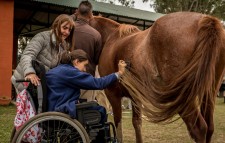Suzette Belgarde Discusses the Healing Power of Horses

FARIBAULT, Minn., August 3, 2018 (Newswire.com) - "The process as we know it today was first developed in Europe in the mid-1940s," reveals Suzette Belgarde, an equestrian expert, and advocate of equine-assisted therapy from Faribault, Minnesota. Belgarde goes on to explain, however, that evidence exists of similar practices as far back as 2,500 years ago. "Therapeutic riding is documented in ancient Greek literature dating back to 600 BC, while modern documentation from Europe begins in 1946," she points out.
Today, equine-assisted therapy is used to treat all manner of conditions, from traumatic physical injuries to anxiety, autism, and genetic syndromes.
Therapeutic riding is documented in ancient Greek literature dating back to 600 BC, while modern documentation from Europe begins in 1946.
Suzette Belgarde, Equestrian Expert
According to Suzette Belgarde, horses make particularly good psychotherapy assistance animals, owing to the fact that they can closely mirror and accurately respond to human behavior. "What's more, there's no judgment with a horse, and that's especially important for psychotherapy," the equestrian expert adds.
As herding animals, horses rely on a constant stream of sensory data to determine safety or danger. Belgarde further reveals that horses can also hear a human heartbeat from around four feet away. "Studies have shown that horses actually have the amazing ability to synchronize their heartbeats with those of human beings," says Belgarde.
She continues, "The unique connection between horses and people allows therapists to gain an invaluable insight into the inner psychology of their clients."
Equine-assisted psychotherapy has been shown to help with matters from self-esteem issues, to boosting confidence and establishing trust in others.
Beyond psychotherapy, horses have also been used for therapeutic purposes surrounding cerebral palsy, developmental delay, and dementia. "Activities are generally tailored to promote physical, occupational, and emotional growth in individuals suffering from a wide range of complaints," says Belgarde.
Other areas where equine-assisted therapy is documented to be highly successful include treatment of severe physical injuries, cases of post-traumatic stress disorder, behavioral and communication issues, substance abuse, and eating disorders. "It's an efficient and effective form of treatment, with equine therapy often yielding positive results in as few as two or three sessions," Belgarde reveals.
"It's a truly fantastic process," adds Belgarde, wrapping up, "and I'd urge anyone interested in equine-assisted therapy, whether for themselves or a loved one, to pursue the options available to them."
To connect with Suzette Belgarde, you can find her on Linkedin.
Media Contact:
Web Presence, LLC
Eric Blankenship
786-332-6554
Source: Suzette Belgarde